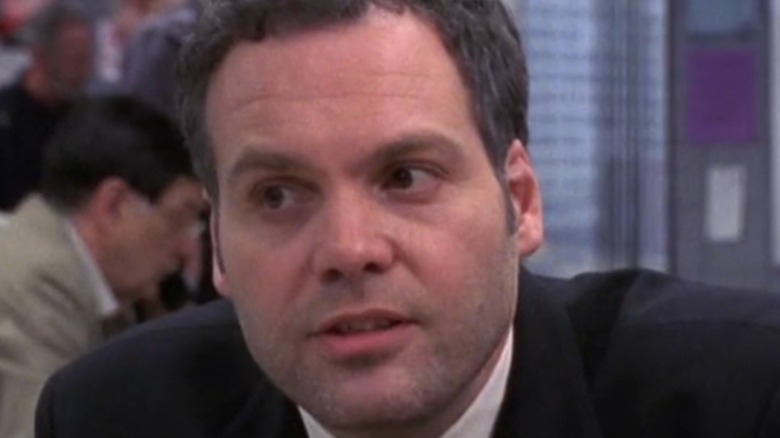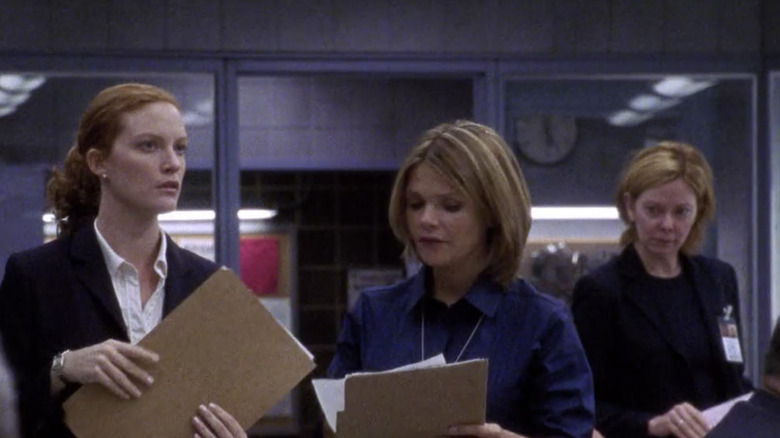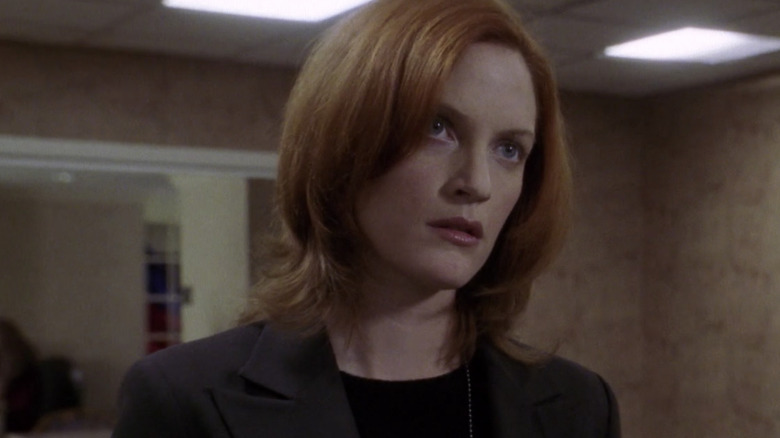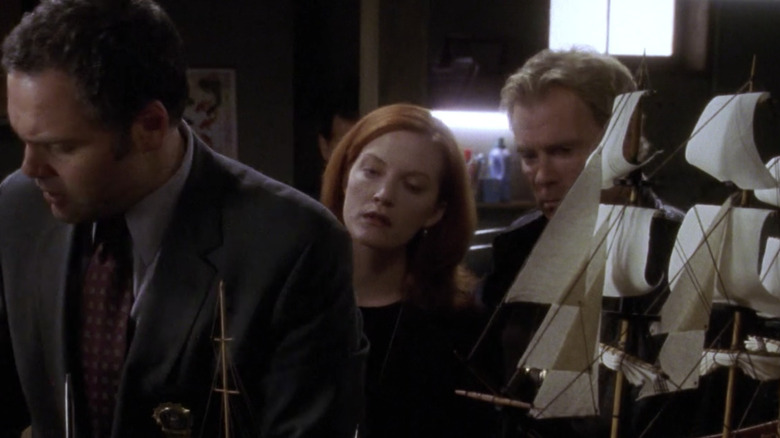The Worst Detective In All Of Law & Order: Criminal Intent
Out of all of the "Law and Order" spin-offs, "Law and Order: Criminal Intent" took one of the most unique approaches to balancing character exploration and investigations. Led by Vincent D'Onofrio's knockout performance as Detective Robert Goren, "Criminal Intent" got more personal than fellow Dick Wolf-produced "Law & Order" shows. A lot of it was thanks to D'Onofrio's involvement, with the series providing a rich, complicated history for Goren. We learned far more about Goren and the other detectives than in typical "Law and Order" programming, with the final seasons becoming shorter and even more character-driven, following D'Onofrio's character in therapy sessions and taking a slower pace with cases.
While Goren is certainly a draw to the world of "Criminal Intent," the NBC procedural brought in plenty of other lively and layered detectives, too. At one point, the series switched between Goren and his partner, Alexandra Eames (Kathryne Erbe), and a set of other detectives episode to episode. Such tactics led to a hit-and-miss style with "Criminal Intent" characters in terms of how well they were developed and how well they worked in the narrative; it didn't help that D'Onofrio set the bar so high with his performance. However, there is one detective from "Criminal Intent" who stands out as the worst of the bunch.
G. Lynn Bishop is the worst Law and Order: Criminal Intent detective
As previously mentioned, there are plenty of detectives to get invested in on "Law and Order: Criminal Intent," including Mike Logan (Chris Noth) and Zachary Nichols (Jeff Goldblum), which is why picking the worst of the lot is a clear choice. The worst detective from the 10-season series is G. Lynn Bishop (Samantha Buck). As Buck's IMDb page reminds us, she appears in seven episodes and is Robert Goren's partner while Eames is away on maternity leave.
The tension between Goren and Bishop is evident from the beginning, with Goren often openly comparing Bishop unfavorably to Eames and struggling to communicate with her. As a detective, she never finds her footing in the Major Case Squad, but her character does bring to light Goren's shortcomings and his lack of people skills, which are usually complemented by Eames.
Bishop appears in Season 3 of "Criminal Intent," and she doesn't stay long. After making her debut in the 2003 episode "Pravda," she sticks around through the end of the 2004 episode titled "Mad Hops." Eames returns and restores the show's core partnership, and many fans found Bishop made them appreciate Eames even more. "[She's a] boring character, didn't even rise to the level of a wannabe Eames," Reddit user u/kaan3836 wrote in a recent thread about the character. Elsewhere in the thread, Redditor u/cfinboston theorized Bishop's purpose was to make audiences "realize that Eames wasn't a sidekick," but a valuable partner to Goren.
Bishop couldn't keep up with the pace of the Major Case Squad
While it's arguably true that G. Lynn Bishop is introduced into "Law and Order: Criminal Intent" as a way to reinforce how strong the core partnership of Goren and Eames is, she also becomes overwhelmed at the Major Case Squad. As the show's opening says, "Criminal Intent" focuses on "the worst criminal offenders" by tackling the most brutal and high profile homicides. Goren and Eames confront everything from lying judges to stone-cold serial killers, and it hardens them in a way that makes them rightfully suspicious of most. Bishop, however, lacks this quality, questioning Goren's aggressive interrogation techniques with people she saw as witnesses, but he sees as potential suspects, much like Eames would.
In Bishop's debut episode, Season 3's "Pravda," she immediately questions Goren poking at a witness' story, accusing him of turning a "friendly witness" into a "hostile one." By the time the show's finale rolls around, Goren is almost exclusively talking, running an entire interrogation, while his partner looks on and watches, hopefully learning, as she discovers how complicated Major Case homicides can be, with the rich and powerful often lying to protect themselves from not just time behind bars, but bad press, too.
Bishop didn't gel with her partner
G. Lynn Bishop has an uphill battle from the beginning, partnering with a man who has a very particular communication style. Even before Season 3 of "Law & Order: Criminal Intent," it had become clear Detective Goren could often step on toes, something Detective Eames helps him with, often acting as a mediator with others on the force who are offended by Goren's sometimes cold nature.
The fact that Eames has the right disposition to make this partnership work (even after a transfer request she quickly withdraws) is a testament to her character as a cop. She finds a way to focus Goren's skills and complement them perfectly, leading to most cases ending in the two verbally hammering a confession out of someone. They manage to be one perfect unit at just about everything, but Bishop struggles to do the same. Case in point: Her lack of communication skills clashes with Goren's. In "Pravda," a witness asks if they take notes, to which Goren jokes they haven't "worked that out yet." Bishop replies coldly, saying she doesn't like that. "Eames would've," Goren shoots back.
In the following episodes, the two get distracted like this multiple times, arguing over everything from who will drive to who should take lead with suspects. "Eames likes to drive, so she drives," Goren says in the Season 3 episode "Stray," further exemplifying Bishop's knack for getting caught up in small situations that can stall a case's progress.



